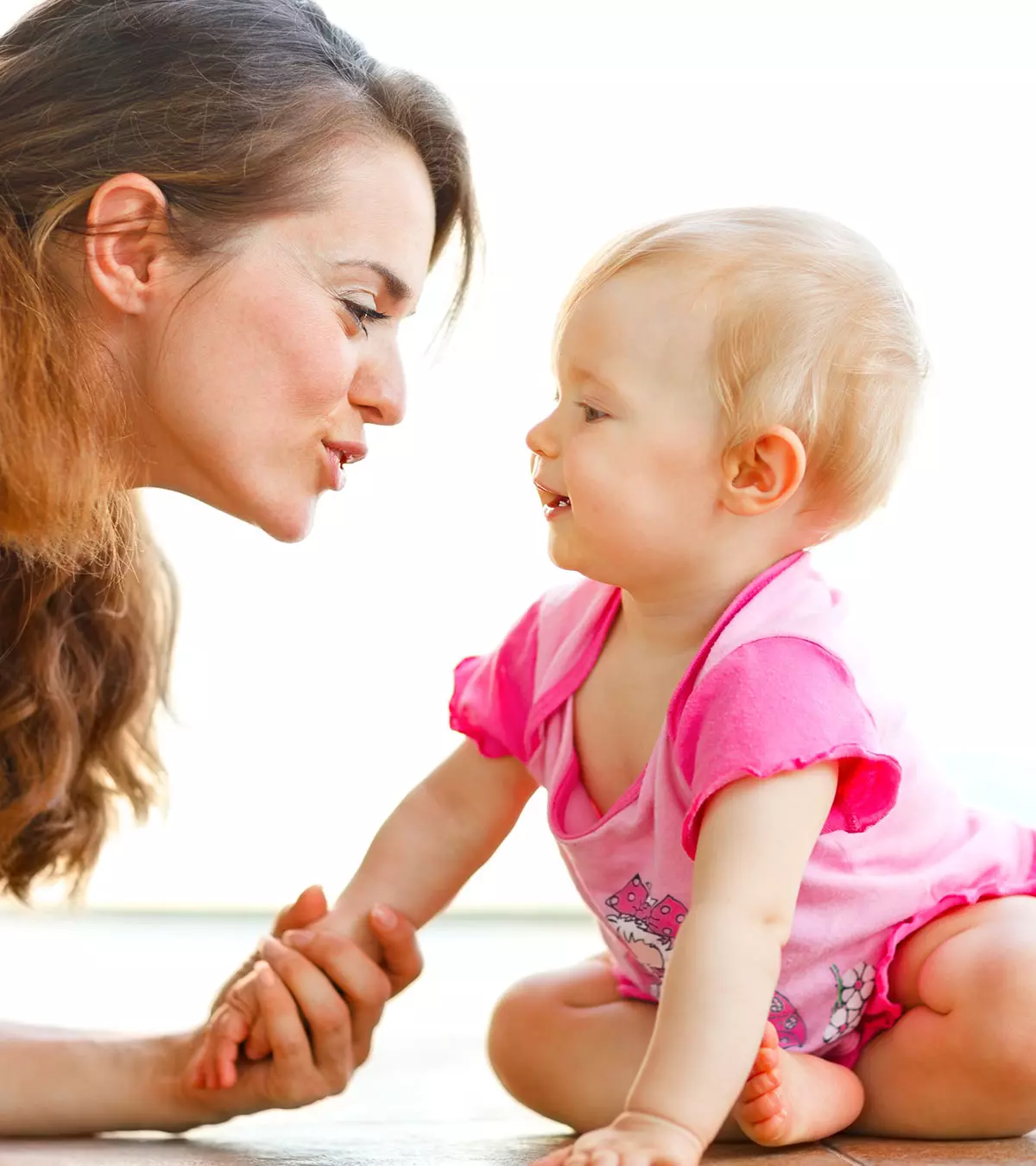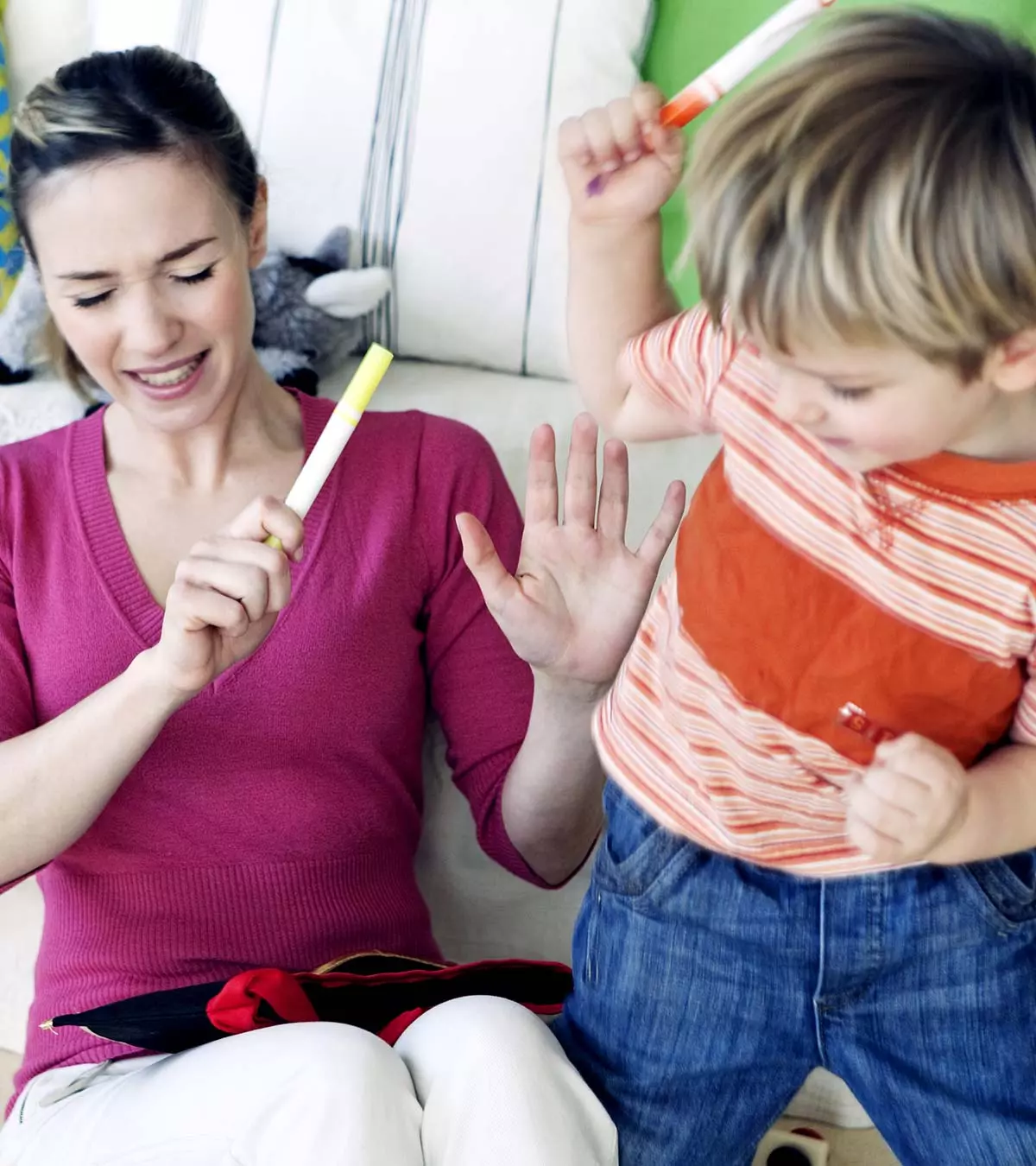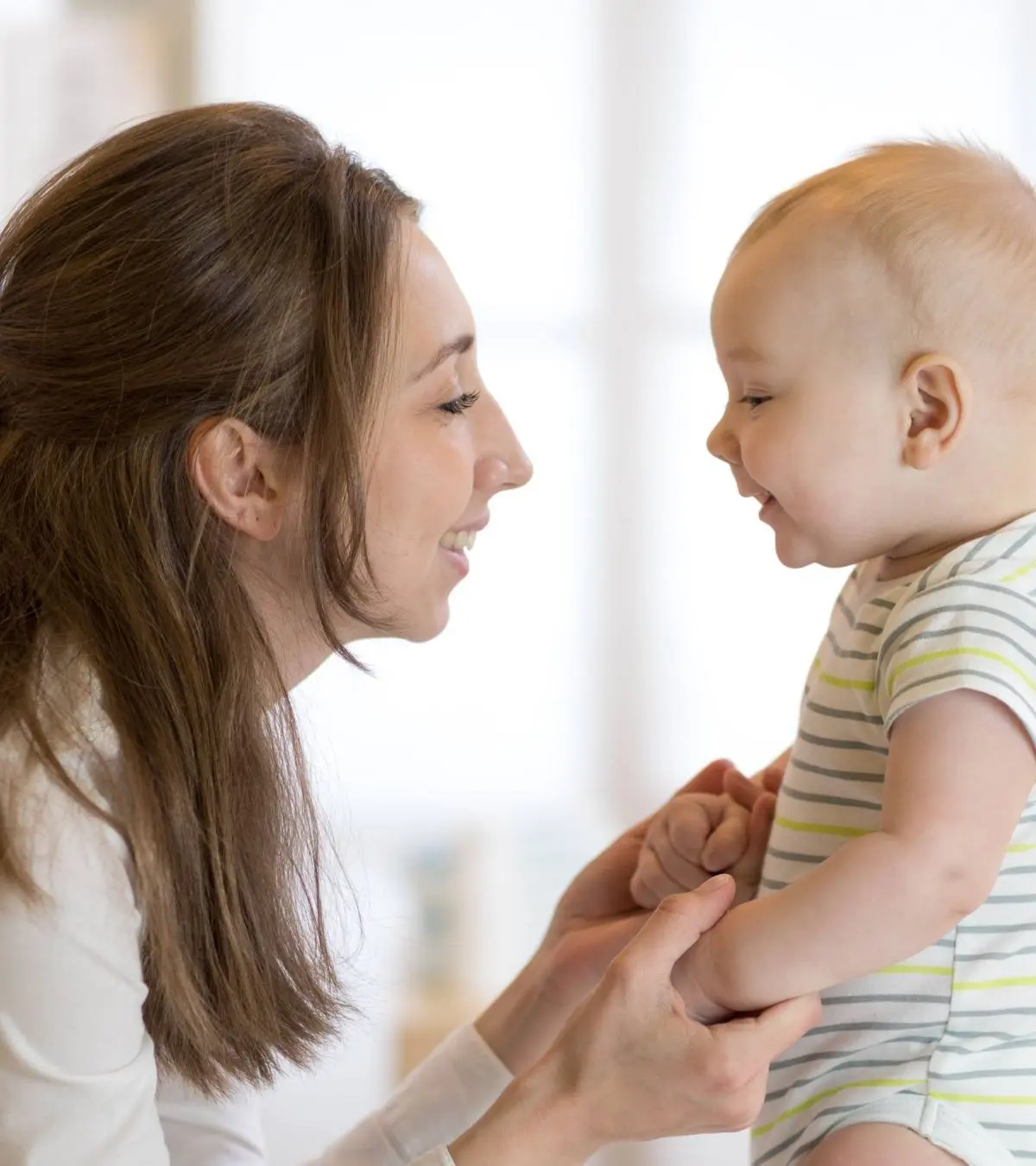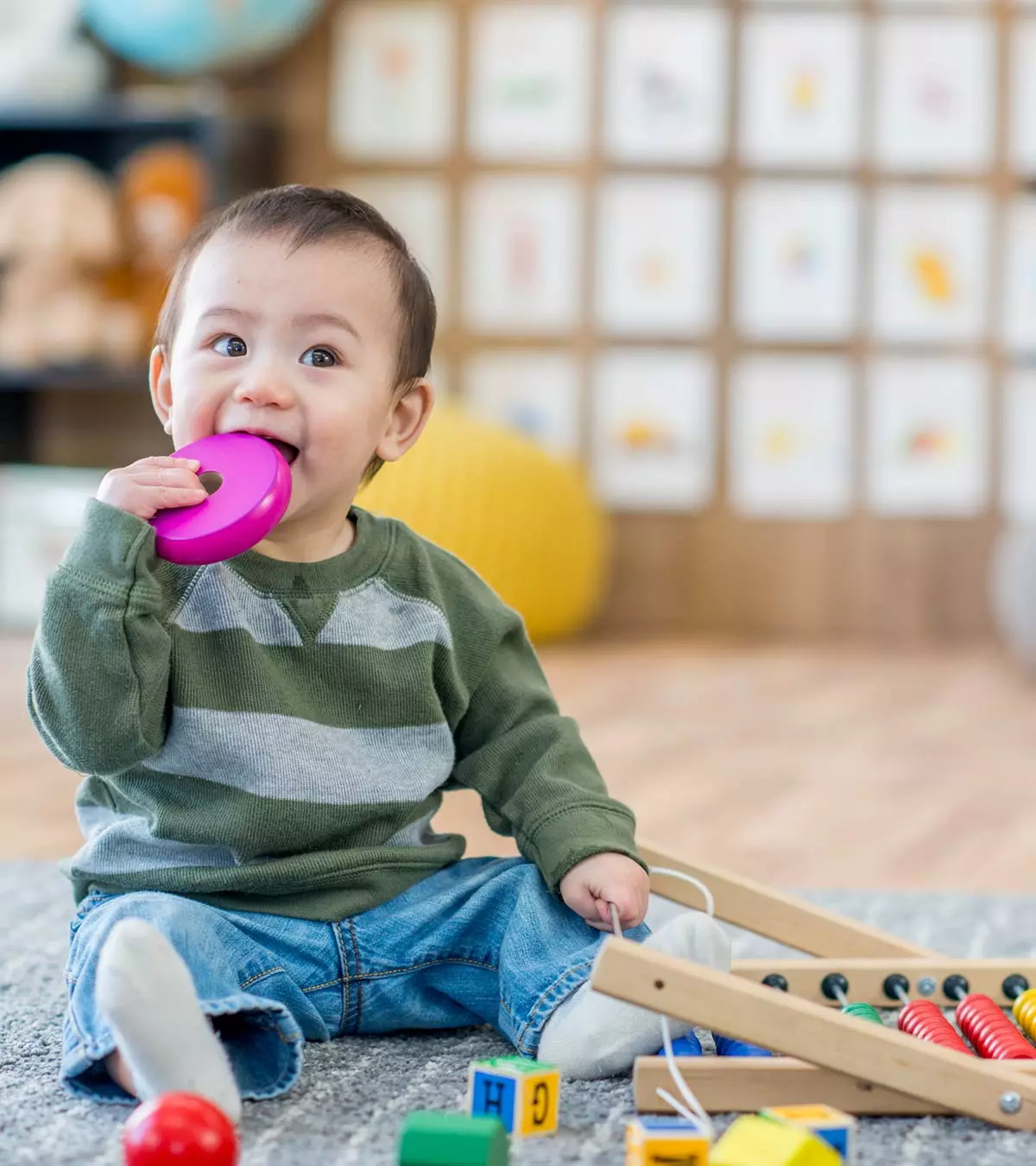
Shutterstock
As a busy parent, it’s essential you analyze when and how to leave your children home alone safely. Since finding a babysitter is not always a viable option, you could leave your older child in charge. However, one question most parents ask while considering is at what age can a child stay home alone with a sibling? You’ll also have to keep in mind the age and maturity of the older child.

According to the American Academy Of Child & Adolescent Psychiatry, 40% of children have been home alone at some point. Although this is a common situation, parents often find themselves stressed about their child’s safety, especially if it is their first time on their own (1).
Preparing your older child to be in charge by informing them who to contact if they feel unsafe and reminding them not to open the door for strangers can help you and them feel more at ease.
Read further to learn about the factors to consider when allowing an older sibling to babysit, the legal age to stay home alone with siblings, how to prepare them for it, and at what age they can begin to do so.
Key Pointers
- More than age, the child’s maturity determines their baby’s sitting capability.
- Also, the legal age for babysitting varies from state to state.
- You may determine if your child is ready to babysit based on their ability to handle strangers, obedience to rules, and compliance with safety protocols of the house.
- It may also help prepare your child to babysit by enrolling them in a few courses and teaching them the basic household responsibilities.
At What Age Can A Child Babysit A Younger Sibling?
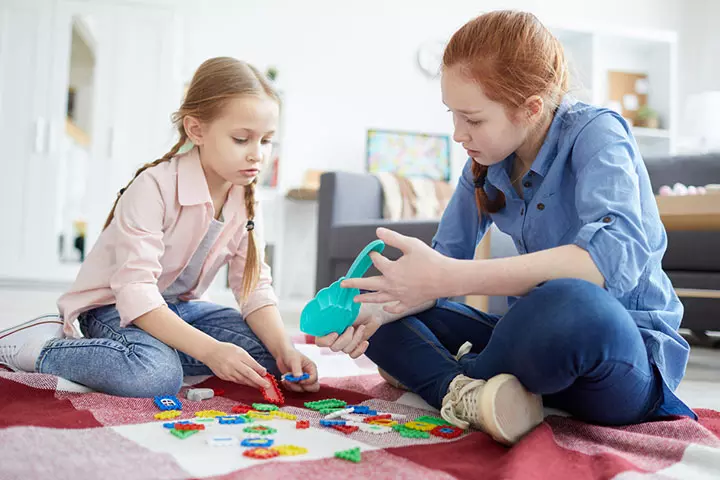
Age is not the only deciding factor to determine if the child is mature enough to care for siblings as different children mature at different rates. Dr. Pierrette Mimi Poinsett, a board-certified pediatrician and a medical consultant for Mom Loves Best states, “There isn’t a legal age mandating the minimum age for a child babysitter. A good rule of thumb for a minimum age for siblings sitting for short periods is between 11 and 12 years old. Younger siblings should be over two years of age. On the other hand, the recommended age for an elder sibling for overnight sibling sitting and care of siblings under two years of age is 16 years old.”
You should also consider the guidelines set by your state, if any, to know the right age for children to be at home by themselves. Some states have no agreed-upon minimum age for kids to stay home alone. In such cases, it is important to consider factors such as the duration of time alone, the children’s health condition, and the elder child’s overall maturity level, knowledge of safety procedures, and ability to handle emergencies.
The table below shows the minimum age requirement for children to stay home alone in a few US states (2) (7) (8) (9) (10) (11) (12) (13) (14).
| State | Minimum age guideline |
|---|---|
| Illinois | 14 |
| Oregon | 10 |
| Maryland | 8 |
| Florida | 12 |
| Georgia | 9 |
| Kansas | 10 |
| Minnesota | 8 |
| North Dakota | 9 |
| North Carolina | 8 |
| Washington | 10 |
| Virginia | 9-10 |
What To Consider When Letting An Older Sibling Babysit
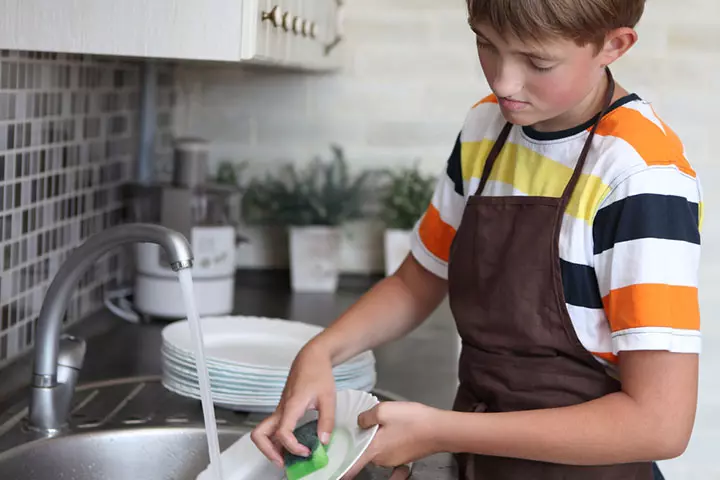
Apart from the age, one needs to consider the child’s physical, mental, and emotional well-being and the laws and policies of the state you live in to decide if the child can be left alone at home.
Pediatrician Dr. Chetan Singh suggests, “Before letting an older child babysit younger siblings, consider a few important points. Do not allow a sick child to take on the task. Use modern tools like CCTV for monitoring. Additionally, teach safety measures and ensure the child knows how to call for emergency help.”
Consider the following factors before letting the elder child babysit the younger child unaccompanied and without parental support.
- The child’s physical and mental maturity level to care for themselves and their siblings
- The child’s willingness to take up the responsibility
- The child’s compliance with house rules
- The child’s capacity to make correct decisions
- The child’s behavior and composure during unexpected events or stressful situations
- The child’s fears and apprehensions about being alone at home
- The child’s understanding of taking charge and not abusing power
 Point to consider
Point to considerThings The Elder Child Should Be Aware Of

Board-certified diplomate of the Philippine Pediatric Society Dr. Maria Carmela Villania-Mamauag suggests, “Although the age of responsibility differs from one state or country to another, it would generally be safe to allow an older sibling, who is aware of safety and danger and knows how to take care of themselves before parents consider entrusting the care of a younger sibling.” To determine if your elder child is ready to stay home alone and be in charge of a younger sibling, you can assess their abilities based on the following criteria (3).
- The child knows the protocols for handling strangers at the door.
- The child has memorized the parents’ and local emergency authorities’ contact numbers.
- The child knows how to talk on the phone – what information to share and what not to share.
- The child is able to warm the food up for themselves and their siblings.
- The child knows and complies with the guidelines for internet use.
- The child has basic knowledge about administering first aid for minor cuts and scrapes.
- The child knows of at least two escape routes from the house in case of a fire or similar
- The child is frank enough to tell you about the events of their day without hiding anything.
- The child has a good grasp of the house rules set by parents and why they matter in the family.
- The child knows about the potential dangers of knives, scissors, medicines, pesticides, cleaning agents, etc.
Before letting your child babysit their sibling, you may consider enrolling them in basic safety courses such as the ones offered by the American Red Cross. You may also look for institutions that train children to check for choking, breathing, CPR, etc (4).
Preparing The Elder Child For Sibling Sitting
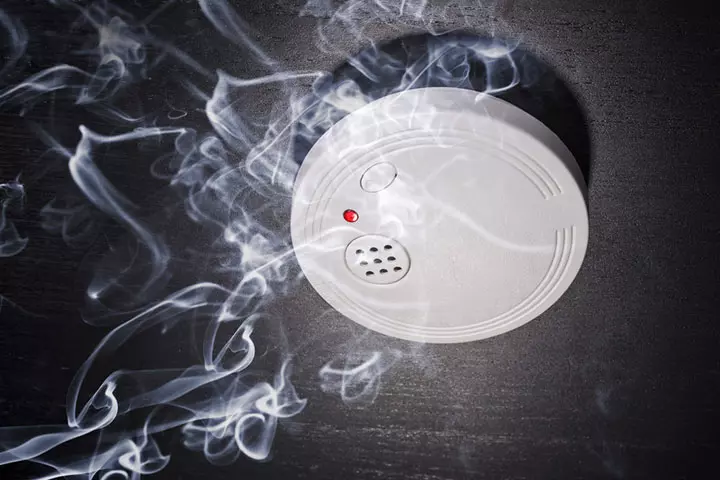
Use these tips to prepare your child to take up the responsibility of babysitting their sibling without parental guidance.
- Inform the elder sibling if you plan to pay them for babysitting. Some families have arrangements to get the elder siblings a thing they want instead of cash.
- Ask if they are willing to sign up for it and assure them that they can step down from the role anytime.
- Run some trials at home, such as letting the elder sibling heat the meals for themselves and the younger one, playing with the younger one, and reading books together. Highlighting the importance of mock babysitting sessions with older children, Dr. Po-Chang Hsu, from the Boston Metropolitan Area, says, “Running a trial session can be a game-changer. Let your older child handle small tasks, like supervising playtime or preparing a snack, while you’re nearby. This lets them practice in a safe setting and helps you observe how they handle challenges.”
- Set some ground rules and make sure they agree to them. These restrictions could include not cooking without parental supervision, not leaving the house, and not inviting neighbors or friends. Remember, house rules for kids should be age-appropriate.
- Teach your children about good touch and bad touch.
- Educate them on what to do in unexpected situations such as
- A small fire in the kitchen
- When the smoke alarm goes off
- When there is a warning for heavy rains, tornados, snowfall, etc.
- Power outage
- Someone calls or comes at the door asking for the parents
- Someone arrives at the door saying the parent has sent for them
- Consider enrolling your children in babysitting courses. This will provide them with examples and advice on caring for younger children without parental involvement. Brooklyn-based board-certified pediatrician Dr. Edward Kulich opines, “A babysitting course is always a great idea. I recommend starting slowly, ideally during the daytime, and having a responsible adult nearby as a backup in case of an emergency. Be sure to post emergency numbers clearly.”
- Teach them how to handle unexpected situations, including what to do if the fire alarm goes off, if someone knocks at the door, or if they feel scared. Discussing these scenarios can help prepare them mentally and ensure they feel equipped to deal with emergencies.
Tips For Parents
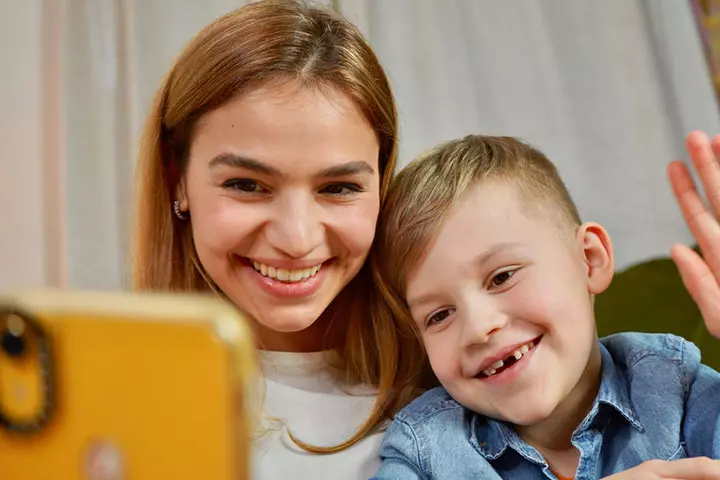
After evaluating all the parameters, if you decide to let the older sibling babysit the younger sibling, keep the following tips in mind (5).
- Run some trials where you go out for about 30 minutes and come back. See whether the elder child is calm and composed or scared.
- Keep enough healthy snacks and fruits at home.
- Provide all the details to your elder child. Inform them who to contact if they feel unsafe and remind them not to open the door to strangers. Also, inform them in advance about when and how long you want them to babysit and when you will return.
- To make it fun and not chore-like, you can rent a movie that they can watch together. Remember that just like professional babysitters, your child also has the right to decline the offer.
- You can decide a time for Face Time with them when you are away. You can consider giving them an iPad, laptop, or phone if it suits your family’s rules and arrangements.
- Ensure that the elder child does not stop having fun or feel burdened in a guardianship role.
- Create a safe environment where the elder child does not feel that they are being robbed of their childhood or are forcibly overburdened.
- Keep asking the child regularly if they are comfortable and still wish to continue to babysit.
- Explain to your elder child the clear distinction between sibling and parental caring responsibilities. Appreciate them for stepping up to help you, but make sure they are not overwhelmed by the
- Reconsider the amount of work and responsibilities you are putting on the elder child’s shoulders, especially if the younger child is very young and needs help with everything, including using the restroom and cleaning their hands.
- Know that it can be overwhelming for a sibling to take on the parental responsibility of a younger child with mental or physical conditions or disabilities.
- Do not go overboard with siblings sitting. Instead, you should consider other options such as professional babysitters, day cares, etc., if possible.
- If possible, keep the neighbors informed about the children being alone, and let the children know that they can reach out to the neighbors in case of an
Frequently Asked Questions
1. Are there any risks associated with leaving a child home alone with a sibling?
Some risks associated with leaving a child home alone with a sibling may include sibling conflicts, lack of supervision in case the sibling is too young, accidents or injuries, especially if the siblings tend to quarrel often, and the possibility of one child being overburdened with responsibilities.
2. What activities are appropriate for a child at home alone with a sibling?
Appropriate activities will depend on the age and interests of the children. Still, generally, safe activities to keep the siblings occupied include reading, watching movies, playing board games, and completing homework.
3. What are the benefits of having a child stay home alone with a sibling?
Allowing a child to stay at home with a sibling may have various benefits, such as developing closer relationships and stronger bonds between siblings and providing a secure environment. Moreover, it can be an economical and practical alternative to a babysitter for working parents. This arrangement can be an excellent way to teach responsibility to kids, helping them learn to take care of themselves and each other.
According to the Connecticut state guidelines, children should be at least 15 years old to care for younger siblings (6). However, this differs among states. So if you are wondering at what age a child can babysit siblings, first analyze their decision-making skills and willingness to take up responsibilities. Next, you can help prepare them for this task by teaching them what to do in unexpected situations and conducting trial runs. You could also ensure their safety by occasionally FaceTiming them. Finally, after taking the necessary precautions, you can ensure that your children are safe and prepared to take charge.
 Quick tip
Quick tipInfographics: How To Strengthen The Relationship Between Siblings?
Encouraging positive relationships between siblings can make your children more responsible. This may improve coordination between siblings when staying at home without being supervised by parents. The infographic below suggests ways to help siblings develop strong relationships.
Some thing wrong with infographic shortcode. please verify shortcode syntax
Illustration: At What Age Can A Child Stay Home Alone With A Sibling

Image: Stable Diffusion/MomJunction Design Team
Leaving kids home can make them independent. But how do you know if your child is ready to be left alone? Learn when it’s the right time to let your kids stay home alone with this video.
References
- Home Alone Children.
https://www.aacap.org/AACAP/Families_and_Youth/Facts_for_Families/FFF-Guide/Home-Alone-Children-046.aspx - Leaving Your Child Home Alone. (2018).
https://cwig-prod-prod-drupal-s3fs-us-east-1.s3.amazonaws.com/public/documents/homealone.pdf - Preparing Your Children to Stay Home Alone.
https://dcfs.illinois.gov/safe-kids/safety/preparing-your-children-to-stay-home-alone.html - First Aid Training.
https://www.redcross.org/take-a-class/first-aid/first-aid-training - The Secret to Successful Sibling Sitting.
https://safesitter.org/secret-successful-sibling-sitting/ - Guidelines for Leaving Your Child Alone.
https://portal.ct.gov/dcf/families/leaving-your-child-alone - Child Supervision Guidelines.
https://pcaga.gsu.edu/child-supervision-guidelines-in-georgia/ - Factors To Consider Before Leaving A Child Home Alone.
https://www.dcf.ks.gov/services/PPS/Documents/PPM_Forms/Appendices/Appendix_1B.pdf - What Does Minnesota Law Saw About Leaving Children Home Alone?
https://cascw.umn.edu/public-policy/child-welfare-public-policy/what-does-minnesota-law-saw-about-leaving-children-home - Home Alone: Is Your Child Ready?
https://www.stanfordchildrens.org/en/topic/default?id=home-alone-is-your-child-ready-197-1416 - Child Protective Services: Frequently Asked Questions.
https://www.wake.gov/departments-government/health-human-services/children-and-family-services/child-protective-services/frequently-asked-questions#:~:text= - Family Resources.
https://www.dcyf.wa.gov/coronavirus-covid-19/families#:~:text=How%20old%20does%20my%20child - Home Alone: When is it okay?
https://www.pwcva.gov/assets/2025-07/2018%20Supervision_English.pdf - When to Leave Your Kids Home Alone.
https://www.ounce.org/pdfs/parent_tips/kids_home_alone.pdf
Community Experiences
Join the conversation and become a part of our nurturing community! Share your stories, experiences, and insights to connect with fellow parents.
Read full bio of Dr. Maymunah Yusuf Kadiri
- Dr. Maria Carmela Villania-Mamauag is a board certified diplomate of the Philippine Pediatric Society with a degree of Doctor of Medicine from Our Lady of Fatima University, Valenzuela City and a Bachelor in Science in Psychology from Saint Louis University, Baguio City which was augmented by a year of Bachelor in Science in Family Life and Child development at the University of the Philippines, Diliman, Quezon City.
 Dr. Maria Carmela Villania-Mamauag is a board certified diplomate of the Philippine Pediatric Society with a degree of Doctor of Medicine from Our Lady of Fatima University, Valenzuela City and a Bachelor in Science in Psychology from Saint Louis University, Baguio City which was augmented by a year of Bachelor in Science in Family Life and Child development at the University of the Philippines, Diliman, Quezon City.
Dr. Maria Carmela Villania-Mamauag is a board certified diplomate of the Philippine Pediatric Society with a degree of Doctor of Medicine from Our Lady of Fatima University, Valenzuela City and a Bachelor in Science in Psychology from Saint Louis University, Baguio City which was augmented by a year of Bachelor in Science in Family Life and Child development at the University of the Philippines, Diliman, Quezon City. - Dr. Edward Kulich is a board-certified pediatrician, a fellow of the American Academy of Pediatrics, and the American Academy of Home Care Physicians. He obtained his Doctor of Medicine from St. George's University School of Medicine, completed a residency in Pediatrics at Maimonides Medical Center, Infants and Children’s Hospital of Brooklyn, and maintains privileges at Cornell, Lenox Hill, Mt. Sinai, and NYU hospitals. He has over 15 years of experience and is the current president of the American Academy of Concierge Pediatricians. Dr. Kulich is the author of The Best Baby Sleep Book and The Best OLSAT Book.
 Dr. Edward Kulich is a board-certified pediatrician, a fellow of the American Academy of Pediatrics, and the American Academy of Home Care Physicians. He obtained his Doctor of Medicine from St. George's University School of Medicine, completed a residency in Pediatrics at Maimonides Medical Center, Infants and Children’s Hospital of Brooklyn, and maintains privileges at Cornell, Lenox Hill, Mt. Sinai, and NYU hospitals. He has over 15 years of experience and is the current president of the American Academy of Concierge Pediatricians. Dr. Kulich is the author of The Best Baby Sleep Book and The Best OLSAT Book.
Dr. Edward Kulich is a board-certified pediatrician, a fellow of the American Academy of Pediatrics, and the American Academy of Home Care Physicians. He obtained his Doctor of Medicine from St. George's University School of Medicine, completed a residency in Pediatrics at Maimonides Medical Center, Infants and Children’s Hospital of Brooklyn, and maintains privileges at Cornell, Lenox Hill, Mt. Sinai, and NYU hospitals. He has over 15 years of experience and is the current president of the American Academy of Concierge Pediatricians. Dr. Kulich is the author of The Best Baby Sleep Book and The Best OLSAT Book. - Dr. Chetan Singh is a senior resident doctor at Safdarjung Hospital, Delhi. He graduated from Vardhman Mahavir Medical College and is trained in advanced NRP at the Indian National Neonatal Forum.
 Dr. Chetan Singh is a senior resident doctor at Safdarjung Hospital, Delhi. He graduated from Vardhman Mahavir Medical College and is trained in advanced NRP at the Indian National Neonatal Forum.
Dr. Chetan Singh is a senior resident doctor at Safdarjung Hospital, Delhi. He graduated from Vardhman Mahavir Medical College and is trained in advanced NRP at the Indian National Neonatal Forum. - Dr. Pierrette Mimi Poinsett is a licensed pediatrician and a health advocate with 19 years of experience. She completed her doctor of medicine from the University of Chicago Pritzker School of Medicine and is currently practicing as a medical consultant in California.
 Dr. Pierrette Mimi Poinsett is a licensed pediatrician and a health advocate with 19 years of experience. She completed her doctor of medicine from the University of Chicago Pritzker School of Medicine and is currently practicing as a medical consultant in California.
Dr. Pierrette Mimi Poinsett is a licensed pediatrician and a health advocate with 19 years of experience. She completed her doctor of medicine from the University of Chicago Pritzker School of Medicine and is currently practicing as a medical consultant in California. 
Dr. Po-Chang Hsu is a medical doctor and medical content expert. He received his medical degree from Tufts University School of Medicine in Boston in 2016. Previously, he did a master’s degree at Harvard University and wrote a thesis on neuroimaging in schizophrenia patients at Brigham and Women’s Hospital. He currently works at Alpas Wellness.
Dr. Po-Chang Hsu is a medical doctor and medical content expert. He received his medical degree from Tufts University School of Medicine in Boston in 2016. Previously, he did a master’s degree at Harvard University and wrote a thesis on neuroimaging in schizophrenia patients at Brigham and Women’s Hospital. He currently works at Alpas Wellness.
Read full bio of Dr. Ritika Shah
Read full bio of Harshita Makvana
Read full bio of Vidya Tadapatri









